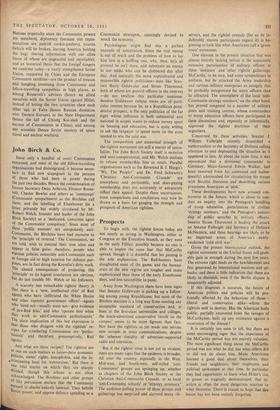Prospects
To begin with, the rightist forces today are not nearly as strong in Washington, either in Congress or the Executive branch, as they were in the early Fifties; possibly because no one is able to inspire the same fear that McCarthy spread, though it is doubtful that his passing is the sole explanation. The Red-hunters have slaughtered most of the game; and the bureau- crats of the new regime are tougher and more ,sophisticated than those of the early Eisenhower days, and less susceptible to panic.
Away from Washington there have been signs that Senator Goldwater is picking up a follow- ing among young Republicans; but most of the Birchite doctrine is a long way from meeting any acceptable standard of conservatism and, at least at the first-class universities and colleges, the much-advertised conservative 'revolt on the campus' seems to be more figment than fact. Nor have the rightists as yet made any serious new inroads in mass communications, despite the inherent timidity of adver,tiser-supported radio and television.
But if the rightist virus is not yet as virulent, there are many signs that the epidemic is broader. All over the country, especially in the West. Mid-west, and South-west, self-styled 'anti- Communist' groups are springing up, whether as chapters of the John Birch Society or the Christian Anti-Communist Crusade, or as local "anti-Communist schools' or 'strategy seminars.' The audience-pulling power of these groups and gatherings has surprised and alarmed many ob- servers, and the rightist crusade (for so its in- dubitably sincere participants regard it) is be- ginning to look like what Americans call a 'grass- roots' movement.
One element in the present situation that was almost entirely lacking before is the apparently extensive participation of military officers in these 'seminars' and other rightist gatherings. McCarthy, to be sure, had sonic sympathisers in uniform, but he attacked the Army leadership and various military enterprises so savagely that he probably antagonised far more officers than he attracted. The atmosphere of the local 'anti- Communist strategy seminars,' on the other hand, has proved congenial to a number of military posts and training centres, whose, commanders or troop education officers have participated in these discussions and, expressly or inferentially, approved the rightist doctrines of their organisers.
Concerned by these activities. Senator J. William Fulbright recently dispatched a memorandum to the Secretary of Defence calling attention to and deprecating the situation as it appeared to him. At about the same time, it was announced that a divisional commander in Germany, Major-General Edwin Walker, had been removed from his command and (subse- quently) admonished for circularising his troops with Birchite literature and describing various prominent Americans as 'pink.'
These developments have now aroused con- troversy in the Senate. which is about to con- duct an inquiry into the Pentagon's handling of troop education, participation in civilian 'strategy seminars.' and the Pentagon's censor- ship of public speeches by military officers. Senator Strom Thurmond is leading the attack on Senator Fulbright and Secretary of Defence McNamara, and these hearings are likely to be an important arena of America's newly- awakened 'cold civil war.'
Given the present international outlook, the rightist movement in the United States will prob- ably gain in strength during the next few years. The extreme right feeds on the bewilderment and fear generated by international tensions and set- backs; and there is little indication that these are likely to diminish, even if the Berlin dispute is temporarily adjusted.
If this diagnosis is accurate, the future of American politics and policies will be pro- foundly affected by the behaviour of those— liberal and conservative alike—whom the rightists seek to destroy. Has the AMerican body politic, partially recovered from the ravages of McCarthyism, built up any resistance against a recurrence of the disease?
It is certainly too soon to tell, but there are some encouraging signs that the experience of the McCarthy period was not entirely valueless. The most significant thing about the McCarthy period was not what he did, but what others did or did not do about him. Many Americans learned a good deal about themselves, their friends and neighbours, their employers and political spokesmen at that time. In particular they had opportunity to learn what Hitler's rise to power so tragically demonstrated; that in- action is often the most dangerous reaction to what threatens. There is reason to hope that this lesson has not been entirely forgotten.






































 Previous page
Previous page